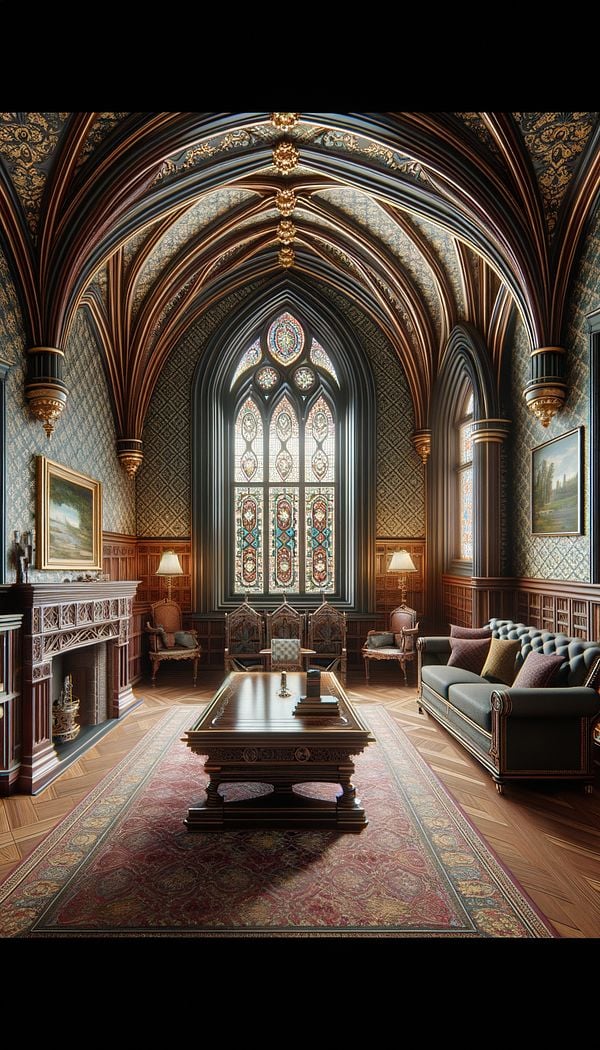What is Neo-Gothic?
Neo-Gothic is a revival of gothic architectural and design styles.
Description
Neo-Gothic, also known as Gothic Revival, is an architectural and interior design movement that sought to revive the Gothic style, which originally flourished in Europe during the late Middle Ages. This revival was particularly prominent during the 18th and 19th centuries, inspired by a renewed interest in the Middle Ages and a desire to promote moral and spiritual values through architecture and design. Neo-Gothic design is characterized by its emphasis on verticality, pointed arches, intricate detailing, and the use of natural materials.
In interior design, Neo-Gothic captures the essence of medieval architecture through the utilization of Gothic motifs, dark color palettes, and ornate decorations. It often features elaborate woodwork, stained glass, and patterned wallpapers. Furniture styles within Neo-Gothic interiors are typically robust and ornamental, incorporating velvet and leather materials for a touch of luxury. This design style is not only embraced in private residences but also in institutional and public buildings, reflecting its broad appeal and adaptability.
Despite its historical roots, Neo-Gothic design can be integrated into modern homes, offering a unique blend of ancient elegance and contemporary practicality. It appeals to those looking for a dramatic, romantic, and historically inspired ambiance within their living spaces.
Usage
Neo-Gothic design is applied in various settings, including residential homes, churches, universities, and public buildings. Interior elements often feature in dining rooms, libraries, and entryways, where the dramatic flair of Neo-Gothic can be fully appreciated. It is also popular in the design of themed restaurants, hotels, and boutique shops, creating enchanting and memorable environments.
FAQs
-
What are the key features of Neo-Gothic design?
Key features include pointed arches, vertical lines, intricate detailing, the use of natural materials, elaborate woodwork, and stained glass. Dark color palettes and patterned wallpapers are also characteristic of this style.
-
How can I incorporate Neo-Gothic design into a modern home?
Integrate Neo-Gothic elements through the use of Gothic motifs in decorative objects, furniture with robust and ornate designs, dark color schemes, and patterned wallpapers. Mixing these elements with contemporary pieces can create a unique and balanced aesthetic.
-
Is Neo-Gothic design suitable for all types of spaces?
While Neo-Gothic design can add a distinctive charm to any space, it is particularly well-suited for areas where a dramatic and historic ambiance is desired, such as dining rooms, libraries, and entry halls.
Practical Application
To apply Neo-Gothic design elements in your space, start by incorporating dark, rich color palettes and ornate decorative pieces that evoke the medieval period. Use furniture that exhibits robust, detailed craftsmanship, and consider incorporating stained glass windows or accents to enhance the gothic feel. Wallpaper with gothic motifs or velvet draperies can add depth and texture to the space. Blending these elements with modern design pieces can create an engaging and timeless interior.
-
Architectural Elements199 articles
-
Design Styles478 articles
-
Furniture Types599 articles
-
Decorative Techniques322 articles
-
Wall Treatments & Finishes157 articles
-
CauseuseA causeuse is a small sofa, typically designed to seat two people.
-
Handkerchief TableA handkerchief table is a type of drop-leaf table where the leaves are supported by brackets that swing out, resembling a handkerchief partially unfolded.
-
Tailored UpholsteryTailored upholstery refers to furniture coverings that are custom-fitted and meticulously crafted for a neat, polished appearance.
-
EscutcheonAn escutcheon is a decorative or protective plate around a keyhole, door handle, light switch, or faucet.
-
CorduroyCorduroy is a fabric distinguished by its textured, ribbed appearance and velvety feel.
